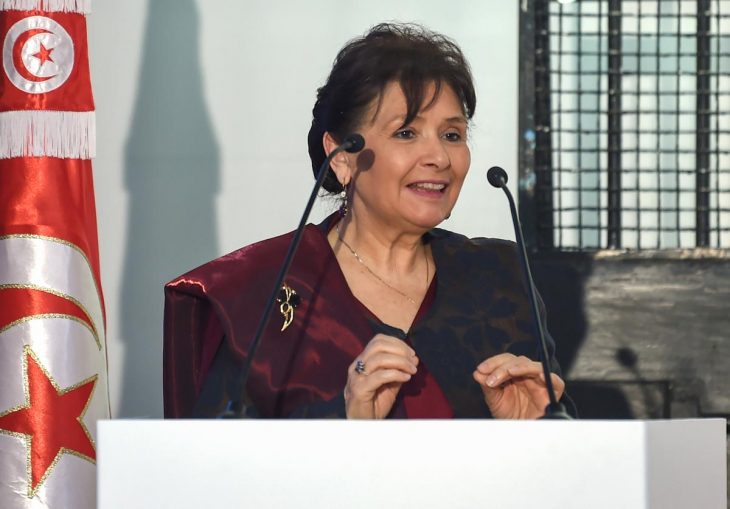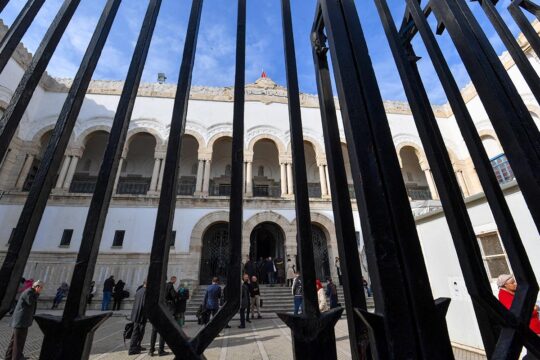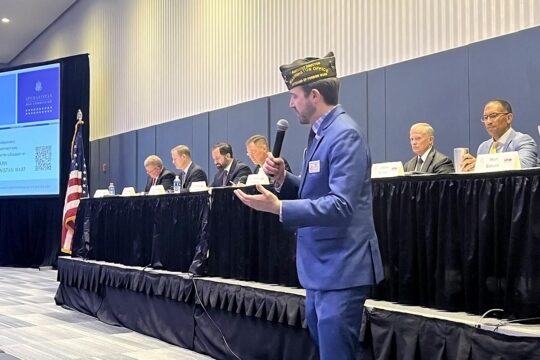"It’s a miracle that we are holding this conference today, given all the obstacles we have encountered during our mission!" exclaimed Sihem Bensedrine, President of the Truth and Dignity Commission (IVD), at the opening of the Commission's international closing conference in Tunis on December 14 and 15. The conference called "The IVD at the end of its mandate: a debate on the results" shared conclusions and a set of recommendations from the Commission’s final report with an audience composed of Tunisian civil society, international NGOs monitoring the transitional justice process, United Nations agencies and the authorities.
Neither the head of government, the country’s president, the parliamentary speaker nor even their representatives were present at this major event in the transitional justice process.
Neither the head of government, the country’s president, the parliamentary speaker nor even their representatives were present at this major event in the transitional justice process. It marks the end of four and a half years of IVD work investigating and documenting human rights violations, economic and financial crimes in Tunisia from independence to the end of 2013. Many conference participants saw the absence of the "three presidents", as they are called, as "worrying". This evident hostility illustrates the lack of support for the Commission’s final report on the part of the authorities, particularly the government, which is nevertheless mandated by law to translate it into measures and action plans within one year of the Commission’s work ending on December 31, 2018.
The four arms of repression
The first day focused on analyzing the machine of repression under Presidents Bourguiba (1957-1987) and Ben Ali (1987-2011). "Those who have ruled Tunisia in the past have not always been true to it,” Bensedrine told the conference. “They have grabbed the power and resources of the country while forcibly silencing all dissenting voices, whether they were Marxists, communists, trade unionists, nationalists or Islamists."
In the Commission's view, Tunisia's despotic system was based on a close link between human rights violations and financial corruption. It was a four-pronged machine, consisting of police repression, an all-powerful ruling party, the media as an instrument of propaganda and official lies, and spying.
It was a four-pronged machine, consisting of police repression, an all-powerful ruling party, the media as an instrument of propaganda and official lies, and spying.
"Whilst the Interior the Ministry had 45,000 civil servants, it had more than 120,000 informants,” said the Commission president. “The whole of society had to be kept under control. Its spies - who rivalled the official intelligence services in speed and efficiency – were everywhere, in the media, administrations, universities and local committees. And they were even more active during election campaigns.”
The Commission uncovered surprising facts about the notorious “Allo Taxi” company, which it says was mainly intended not for ordering a taxi but to gather information. This was "with the blessing of President Ben Ali, according to archives and official documents found by our teams," said Oula Ben Nejma, chair of the Commission’s investigations committee.
Nepotism and fraud
The Commission has also shed light on the mechanisms, legal and institutional loopholes that allowed nepotism, greed and various fraudulent practices. Mechanisms for embezzling State funds and resources included confiscating people’s property supposedly in the "public interest" and giving it to relatives of the regime, re-categorizing protected archaeological land such as in Carthage as residential lots sold at high prices (the beneficiaries being Ben Ali's in-laws), and granting bank loans to the president’s inner circle to set up fictitious projects.

"We have discovered that specific laws were adopted to make possible illegal transactions benefitting the clan of the former president [Ben Ali],” said Khaled Krichi, chairman of the arbitration and conciliation committee. "Did you know about the parallel central bank?" asked Sihem Bensedrine. "It was called 'El Kherba' and was located in Bab Jazira, Tunis. This bank was supplied by Tunisian, Algerian and Libyan smugglers. They bought foreign currency on the black market in China and Turkey and crossed into Tunisia, coming particularly from Turkey.”
We have discovered that specific laws were adopted to make possible illegal transactions benefitting the clan of the former president Ben Ali.
Bensedrine also spoke about the case of the Banque franco-tunisienne (BFT), which is currently before the courts. "It is classic case of collusion between political power and the business community, also in terms of breach of trust, abuse of influence and abuse of position,” she said. “This case, which is toxic to our finances, could bring Tunisia to its knees.” Nationalized in 1989, the bank became a branch of the Tunisian Society of Banks (STB) before being transformed into a private account for Ben Ali's relatives. Loans of 700,000 dinars (270,000 Euros) were granted without any guarantees and without any opposition from the banking oversight authorities, the Finance Ministry, successive governors of the Central Bank or any government ministers. In its fall, the BFT is also bringing down the STB and other state banks, according to the Commission’s analysis. "Because of the misdeeds of our white-collar workers, we are not far from the Greek scenario," Sihem Bensedrine told the conference.
Systematic marginalization of regions
Injustice, marginalization and bad governance spread to the regions. 220 cases were presented to the IVD denouncing systematic discrimination of all kinds suffered by communities, towns and villages as reprisal for opposition to the government.
For example in Sawaf, in the Zaghouan region (50 km from Tunis), a factory that supported the village was closed following a protest against the former president. It was then converted into a prison.
For example in Sawaf, in the Zaghouan region (50 km from Tunis), a factory that supported the village was closed following a protest against the former president. It was then converted into a prison. And former fellaghas, the guerilla fighters against French colonization, were moved in the late 1950s from their villages around Tataouine, in the south of the country, to Cité Ennasr, near Sidi Bouzid, in central Tunisia. Bourguiba feared these intrepid former freedom fighters so much that he put them on lands that they could neither sell nor rent. The survivors and their descendants still live in abject poverty.
Hellish administrative controls
But the repression mainly targeted individuals through acts of torture and sexual violence. 25% of the 57,000 files retained by the IVD concern women. The victims attended nearly 50,000 private hearings, sometimes lasting several days.
It emerged from these private hearings that 15,000 victims were subjected to a daily hell of administrative controls. Sometimes forced to report to their local police station every two hours, some have spent a quarter of their lives going back and forth between their homes and police posts. "Six suicides have been recorded because of administrative controls that enslaved and destroyed people and their entire families, because they deprived former political prisoners of work and the means to support their families. Police officers would say to the victims 'bring your pretty wife back with you', or 'your daughter must have grown up now, show her to us when you come back," Oula Ben Nejma told the conference.
One man who was raped in his childhood because of his father's political opinions said the State ran his life and his torture.
Ibtihel Abdellatif, chair of the women's committee, outlined the pattern of these violations, particularly those targeting women, children and couples, 43 of whom were forced into divorce. Their homes and bedrooms were bugged. Young women were stigmatized by their families and communities after hours of interrogation and sexual violence at police stations. Children were abducted from their homes or schools and sometimes raped to put pressure on their parents who opposed the regime. Minors were thrown into adult prisons.
The Truth Commission cited appalling figures on this. It gathered 198 cases of raped children under 16, of whom 17% girls and 83% boys.
"One man who was raped in his childhood because of his father's political opinions said the State ran his life and his torture," Ibtihel Abdellatif recounted with emotion in her voice.






